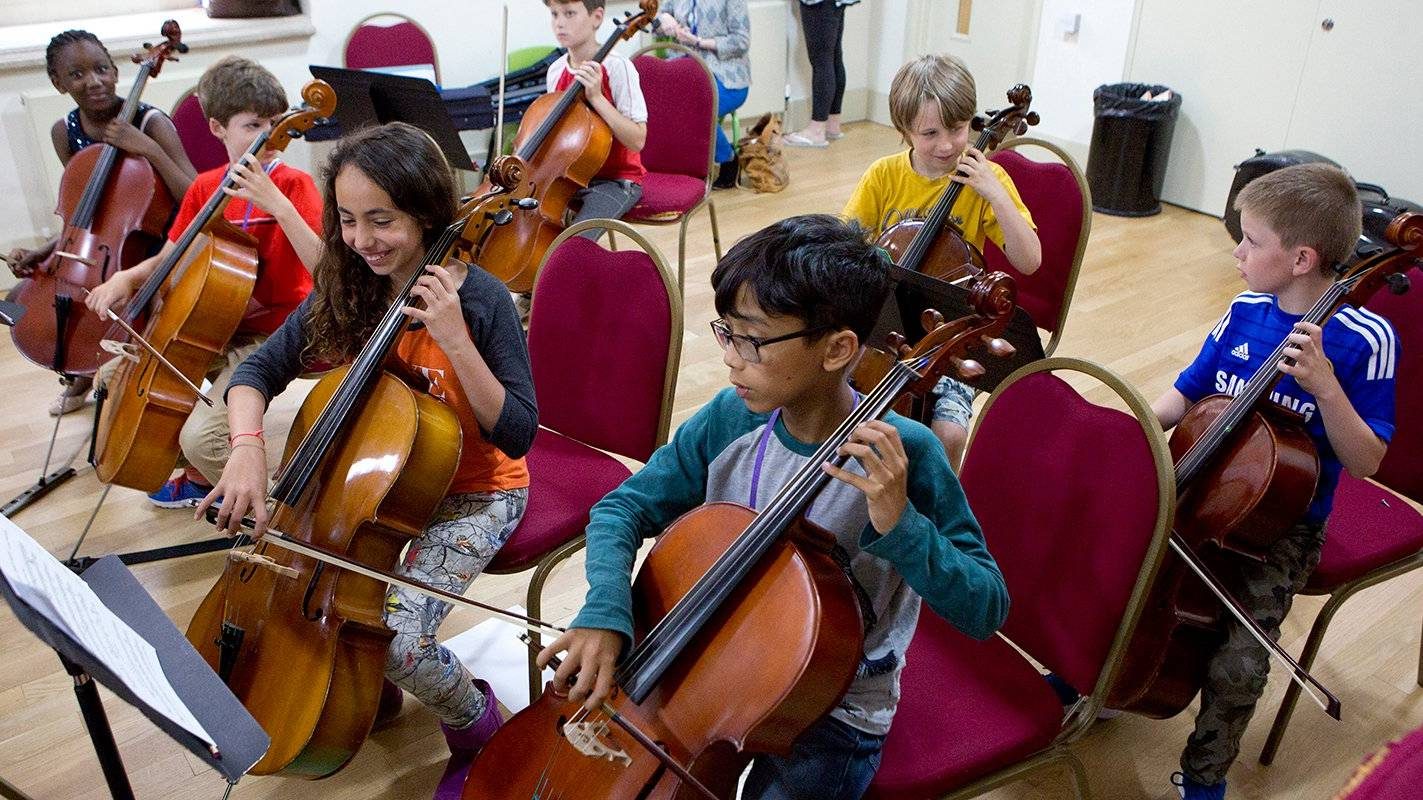
Junior Trinity: String Time (ages 3-11)
Course details
Introduction
The Junior Trinity’s String Time programme is designed for children aged 3 to 11 years old, offering a nurturing environment for young musicians. The programme focuses on helping young string players progress in their musical journey through ensemble and creative work. It provides a wonderful opportunity for children to play music together, building teamwork and musicality, while also receiving professional coaching. The atmosphere of the programme is both relaxed and disciplined, creating a space where young musicians can enjoy learning and improving their skills in a structured but fun way.
Key features
The String Time Programme is divided into a number of groups. The progressive curriculum is designed to gradually develop students’ musical skills from the very first stages of starting to learn a string instrument onwards. This is delivered through a mixture of ensemble and technique sessions combined with creative musicianship, theory training and choirs (Rhythm Runners and Fast Fiddlers only).
| GROUP | SCHOOL YEAR | AGE | STANDARD | SESSIONS |
|---|---|---|---|---|
| Trinity Teenies | Nursery and Reception | 3-5 | N/A | Musicianship |
| String Starters | Year 1 | 5-6 | Foundation Level | Ensemble Dalcroze |
| Stepping Stones | Year 2 | 6-7 | Preliminary – Grade 1 | Ensemble Dalcroze Musicianship |
| Rhythm Runners | Year 3 and 4 | 7-9 | Grade 2-4 | Ensemble Dalcroze Musicianship Choir |
| Fast Fiddlers | Year 5 and 6 | 9-11 | Grade 4-6 | Dalcroze Musicianship Orchestra Choir Technique |
Detailed Information
Instruments
At the String Starters level, students are able to begin learning the violin, viola or cello within the Ensemble session. From their second term in String Starters, students will need to take 30-minute individual lessons in addition to the group classes.
Individual instrumental lessons are available in the early morning or afternoon outside the standard String Time Programme times. Students are not required to have their individual instrumental lesson at Junior Trinity. However, students who take individual lessons in-house benefit from learning with teachers who also have the opportunity to observe their group lessons, to provide a broad general music education.
Dalcroze Eurhythmics Musicianship Training
This musicianship training involves full-body movement to music, speeding up the connections between the ear, the brain and the limbs, and helping the children with coordination, posture, concentration and integration of mind and body. Eurhythmics creates a comprehensive foundation in the fundamental rhythmic elements of pulse, bartime and phrasing, alongside opportunities for expressive and creative development.
Entry Requirements
How to apply
There are two different forms for parents to fill in online:
An Application Form for parents of children who will be 3 years old next September. The only information we will require on this list will be basic data including name, gender, date of birth and contact details.
Parents of children from October of Year 1 onwards who already play a bowed string instrument can complete an Expression of Interest form. This is not an application form, as we assume each year that the 15 places in the upper age cohorts are already filled. The Expression of Interest form will allow us to identify potential students in the event that a place becomes available. This form will request details of instruments played and current level to ensure they would be able to learn with their peers.
IMPORTANT: Beyond the random selection process for Teenies (at Nursery /3 years old) there will NOT be another point of entry into String Time until Years 1-6. Places in Reception and the start of Year 1 will be filled from the reserve list created when we randomly select the 3 year-old Teenies class. This application process will repeat every new academic year. There will be NO waiting list.
More Information
Application Form for children turning 3 the next academic year.
This form is only open to those who are old enough to begin in September 2025. There is a strict application period (until 31st March) and no priority will be given to applications that are completed earlier than others – all applications will be of equal merit. We will hold all applications on file until the closing date.
Once the application period has closed, the selection process for children who will be 3 in September 2025 will be completely random as it is in other institutions. You will be informed if you have been successful or not. We will retain a reserve list of an additional 5 names who will be contacted, told where they are on the reserve list and asked if they wish to remain there.
Expression of Interest for children in Years 1-6
The Expression of Interest form will only be open to students who wish to start in the following academic year. The period for submitting an Expression of Interest is October to September.
We hold all the Expressions of Interest on file during the academic year, should an older student leave the programme. In September each year, this data will be removed to comply with GDPR. Parents will need to submit another EOI for the following academic year to ensure we have the most current information about their children on file.
The selection process for existing instrumentalist students will again be random (only eligible students of the correct age and standard will be considered). For an indication of expected levels, select Groups from the column on the left.
Existing instrumentalists will be asked to play to the String Time Programme Manager to assess whether they are a similar standard to the group they would be joining. This is important as if a child is playing at a lower level than the rest of the group they will become extremely disillusioned and anxious about classes.
